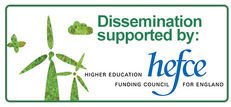Carbon week - embedding sustainability into all second year students
Climate change, sustainability and decarbonisation will be key factors in every business decision a student will make during their careers, so we want to ensure that Aston students are ahead of the game. Carbon Week (2 - 6 November 2015) was an ambitious 5-day programme to bring climate change awareness and low-carbon design thinking to all our Year 2 students.
Day 1 we invited every Year 2 Aston student to the Genting Arena, NEC (Birmingham) on November 2nd for a day of talks, debates, comedy and employer workshops. Days 2 - 5 had 12 electives available covering a broad range of topics around the subjects of; the policy, the ethics, the public perception, the business models and the social impact of climate change and decarbonisation.
Students had to complete project work in line with these electives within groups.
Top 3 learnings
1 We quickly learned that it was a unique challenge to advertise our event in ways that would appeal to all our students from across every School and course in ways that would resonate with each one individually, and persuade them that this was an unmissable event which would provide added value to their student experience, studies and career prospects. We learned that our students need messages such as these reinforcing through many different channels, direct and tangential, as some students would be interested in the academic value of participating, some in the added value to their career paths, others in the spectacle and novelty of the event, and some in the subject matter alone.
2 We realised that our students also needed incentives to attend that were real and “immediate”, and which academies the event, to reward their participation and acknowledge their input. Even though the event was free to attend (and transport and lunch had been provided), the “draw” could not be guaranteed. We ensured that students attendance was acknowledged by a tick in their MAP (My Aston Portal) record – meaning that it would be included in written references by their tutors – and by CAP Points (certificates recorded on their HEAR [Higher Education Achievement] Record). If they attended the Day 1 conference, they would get CAP1; if they attended day 1 and 5+ electives, CAP2; if they attended those and did the Project Work, then they got CAP3.
3 We learned that a project of this scale and ambition needs the support and drive of many senior staff members around the university, who are able to make quick decisions which are appropriate to the intended impact of the day 1 conference event and of the electives and project work. Businesses welcome this kind of necessary yet aspirational teaching experience from a university and appreciate the added value that this gives our graduates. Those staff and employers need to be welcomed to this project and kept informed of its progress and impact year-on-year, and new supporters need to be fostered annually to broaden its appeal.
Videos









 Except where otherwise stated, content on this site is
licensed under a Creative Commons Attribution 3.0 License.
Except where otherwise stated, content on this site is
licensed under a Creative Commons Attribution 3.0 License.
